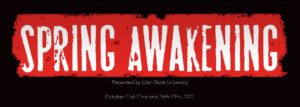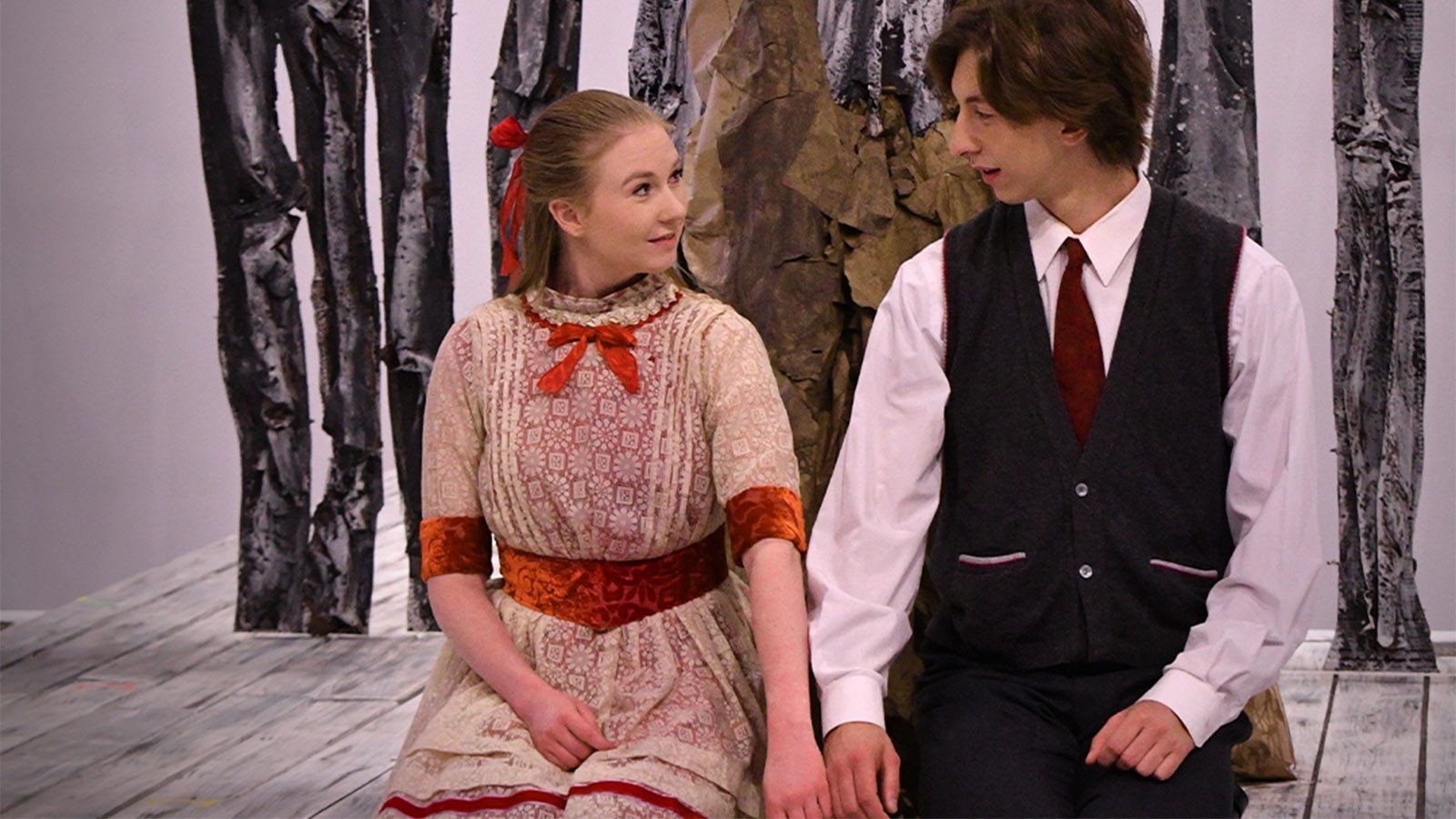LOGAN — “There’s a moment you know…you’re f***ed.” For me, this realization came after the second song of Utah State University’s production of Spring Awakening. To be fair, “Totally F***ed” is likely too dramatic of a description. However, the University’s production, directed by Jason Spelbring, does not do the powerhouse musical justice. Instead, it feels more like an amateur production.

Universities often have more resources, preparation, and flexibility with content than other theatre companies in Utah. Some of my favorite productions have been produced by universities, and audiences can typically expect fairly high standards from such productions. I was so hoping that I would love this rendition of Spring Awakening, as I have loved others in the past, but with a noticeable lack of energy from the beginning, I was never moved to that level of emotion.
Spring Awakening, with music by Duncan Sheik and a book and lyrics by Steven Sater, is the 2006 ground-breaking eight-time Tony Award-winning Best Musical. Set in late 19th century Germany, Spring Awakening is based on German playwright Frank Wedekind’s 1891 play of the same name. The play follows a group of teenagers struggling with various concerns of adolescence, including sex, desire, the pressure to perform well in academia, and religion in an oppressed society.
The character roles in this show are juicy, allowing for intense and emotional performances. However, the performances at Utah State felt shallow, often with the actor staring into the distance without seemingly having a true connection to the material. There were some moments where the actors seemed to tap into more emotion, but they were few and far between, especially considering that these characters are dealing with so much grief, fear, and anger.
Chemistry between characters is absolutely vital for an ensemble show like Spring Awakening. Unfortunately, Alli St. John’s intimacy direction failed to foster any viable chemistry anywhere in the cast. This was particularly disappointing in the lead characters, Melchior (played by Andrew Moody) and Wendla (played by Nicole Frederick). In the musical number “Touch Me,” Moody is awkward and looks like a nervous actor. This continues in “The Word of Your Body,” where Moody and Frederick are not in sync with each other, resulting in a definite lack of sexual tension and no apparent desire for physical intimacy. Their sex scene at the end of Act One in “All Will be Forgiven” was not believable, and it was burdened by Spelbring’s non-sensical choice to conceal it behind a tree instead of playing it in a hayloft, as the script states. The result was a moment that looked awkward and forced, not at all intimate for the powerful moment the two characters are supposed to be experiencing for the first time.
I was disappointed that some of the heavy content from the script seemed toned down. Hanschen’s masturbation scene did not read as believable at all when performed by Ben Quiroz.
As a whole, the female ensemble members had stronger performances than the males. The latter displayed many moments when vocal entrances were late, and their singing was often not in sync. This made the show appear unrehearsed, and the actors seemed timid. Awkward pauses made me feel like lines were forgotten. There was also a long pause during the beginning of the musical number “My Junk” where an entire phrase was missed. These issues did improve somewhat throughout the show, getting better towards the end as the actors became more confident and more open to vulnerability.
While I personally love Shiek’s rock and roll score, it takes quite talented vocalists to keep the songs interesting. While the actors had nice voices and were able to hit the notes most of the time, their performances lacked flare. Under the music direction of Dallas Heaton, the vocals largely sounded bland. I did appreciate the live orchestra, however. At times I felt that they were putting in extra work to adjust for the off tempo or volume of the singer. Additionally, there were several times when the actors or their mics should have been louder.
The stage combat by fight captain Ashlynn Rober (who also plays Ilse) was another shortcoming of this production. None of the fight scenes appeared realistic, with one particular slap that was almost comical because of how far away the actor’s hand was from the other’s face and the mistimed sound. There is also a scene where Melchior strikes Wendla with a wooden switch repeatedly, though there was almost no sound at all and the violence did not register in an impactful way. I sat through the scene largely unaffected when normally it makes me shutter.
The scenic design by Michael Francis did not serve the show well. The entire set was a forest, filled with trees and nothing else. With very minimal levels or changes throughout, the set remained flat and boring, not functionally representing any locations or giving the actors much to work with. Mixed with a hazy fog from smoke machines, I got the sense that the set design was just to provide a spooky environment, which was not the most fitting for this production. In addition to the trees, there were some projections utilized from projection designer Melanie Valera Garcia, though I did not care for those either. The clouds looked too animated, and other aspects such as colorful swirls were just frivolous, not aiding the production in any way.
I did enjoy the costume design from Amanda Cardwell-Aiken, which highlighted the time period and was one of the only aspects grounding the production in the reality of the setting. However, it seemed odd to have several actors wearing nail polish, which was not fitting for their characters or the time period.
Often what holds a show like this together if performances or technical elements are lacking is the passion of the cast. I simply did not feel this from this cast. Some of this could also be due to the directorial choice to forego the use of handheld microphones as props (unlike most productions of Spring Awakening). The microphones are typically used as a tool that helps emphasize the dramatism when the character’s suddenly break out in driving and emotional rock songs that pull the audience out of what is actually happening on stage in real time and into the character’s psyche.
This review points out many flaws in the production and choices that I did not care for. However, a casual viewer looking to indulge in heavy emotions and teenage angst might find this production more appealing and worth the inexpensive ticket price. I also mentioned several moments of heavy content. While the musical does deal with a lot of dark material including abuse, suicide, incest, rape and abortion, it provides beautiful moments of hope with important messages that need to be shared. Even though this production of Spring Awakening was not executed strongly, there is still much to be gained from the story alone, particularly the pressure adults place on children and the harm that can come from that. The story highlights the abuse of teenagers by those they trust who are ultimately dishonest and damaging. Spring Awakening is an impactful coming-of-age musical with messages and meaning that can likely be gained by any interaction with it. While I wished for more passion to further illuminate these themes, the content remains relevant, nonetheless.
Spring Awakening is just not a production that works when done half-heartedly. With an apparent lack of energy and chemistry, there is not a lot to pull this production together. And while there is an inherent value to staging Spring Awakening, the many shortcomings made watching it ultimately underwhelming.
[box]Spring Awakening plays Wednesdays through Saturdays at 7:30 PM and Saturdays at 1 PM through October 29 at the Morgan Theatre in the Chase Fine Arts Center on the campus of Utah State University. Tickets are $10-15. For more information, please visit https://cca.usu.edu/theatre/playbill.[/box]
